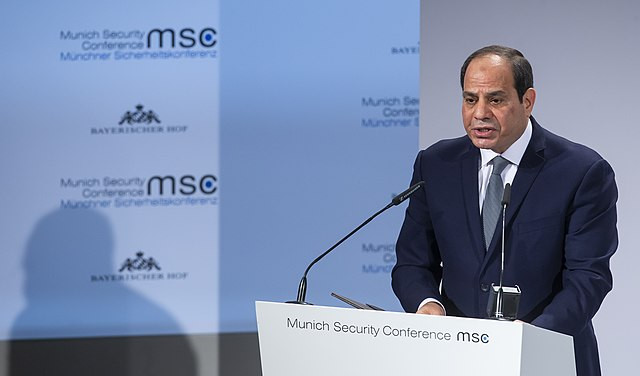On Monday, the Egyptian National Election Commission announced that incumbent President Abdel Fattah el-Sisi won a second term with an overwhelming 89.6% of the vote. He is set to continue leading the North African nation until 2030.
This election set a record for voter turnout. Over the three days of voting from December 10 to 12, 66.8% of the country's 67.3 million registered voters participated, the highest in history.
Sisi's re-election was widely anticipated, especially against the backdrop of regional turmoil, which further united the Egyptian people. Many believe that no one is better suited to lead the country during such a critical period than the former army marshal.
Wafaa Hassan, a 43-year-old housewife from the suburbs of Cairo, expressed her hope that Sisi would ensure Egypt's security and stability amid the risks of regional war spillover, despite her opposition to economic policies that have led to rising prices.
Sisi, 69, a military man, came to power in 2013 after overthrowing the Morsi government and was elected president in 2014 and 2018. Following a national referendum in 2019, Sisi amended the constitution to extend the presidential term from four to six years.
Egypt, the most populous Arab country, faces dual challenges of an economic crisis and external turmoil. Inflation above 30% and high debt have plagued Sisi's government in recent years. The country is sandwiched between two warring neighbors, Gaza to the northwest and Sudan to the south, facing the pressure of war spillover.
In recent days, the Houthi rebels in Yemen have intensified attacks on ships passing through the Red Sea, leading several international shipping giants to bypass the Suez Canal route and navigate around the Cape of Good Hope in Africa, indirectly impacting Egypt.
Infrastructure development has been a hallmark of Sisi's governance over the past decade. From thousands of kilometers of roads to the expansion of the Suez Canal and building a super city in the desert as the new capital, these projects reflect Sisi's ambitious development plans. Critics argue that this approach has exacerbated the debt burden of the already impoverished country, but the Sisi government believes it is crucial to meet the needs of the country's growing population and attributes the economic downturn to the COVID-19 pandemic and the Russia-Ukraine conflict.
Egypt's economy remains Sisi's primary challenge. With inflation hovering above 30%, high living costs, severe unemployment, and a third of the country's 105 million population living in poverty, the economic situation is dire. A significant devaluation of the Egyptian pound has further eroded household wealth. Official data shows that over the past 22 months, the Egyptian pound has depreciated by 50% against the US dollar.
Additionally, Egypt's government debt, one of the highest among emerging market countries, stands at 97% of GDP, about $165 billion, raising concerns about debt default. In early October, Moody's downgraded Egypt's sovereign credit rating from B3 to Caa1, citing foreign exchange shortages affecting debt repayment capacity. By 2024, Egypt needs to repay $29.2 billion in foreign debt principal and interest, about one-fifth of the total foreign debt and 85% of net international reserves.
Riccardo Fabiani, North Africa Project Director at the International Crisis Group in Belgium, noted that Egypt's key role in the region's turbulent situation would strengthen its negotiating power with international creditors. To prevent the collapse of this pivotal country, more international capital can be expected in the future.
As the only Arab country bordering the Gaza Strip, Egypt's geographical location and historical entanglements give it significant influence over both sides of the conflict. Israel and the United States have eyed Egypt's Sinai Peninsula as a potential reception and settlement point for Gaza refugees. However, Sisi has clearly refused, citing a range of national security, political, and economic risks for Egypt, and proposed relocating refugees to Israel's Negev Desert instead.
In the Israel-Palestine conflict, the Sisi government plays a key role in mediation and communication, facilitating a seven-day temporary ceasefire at the end of November. Overall, the Sisi government prefers to be a spokesperson for the Palestinians but is unwilling to take on the responsibility of housing and welfare for millions of Palestinian refugees.
According to the Palestinian Ministry of Health, as of December 15, the current conflict has resulted in approximately 18,800 Palestinian deaths in the Gaza Strip, mostly women and children, with over 51,000 injured and many missing. The region has been reduced to ruins, with half of the coastal area's housing damaged, leaving nearly 2 million people displaced due to shortages of food and clean water.
Israeli data previously showed that about 1,200 Israelis died in the conflict, with over a hundred hostages still detained.
"The record turnout in Egypt's election was not only to elect the next president but also to express their rejection of this inhumane war to the world," Sisi said shortly after the election results were announced. He emphasized that the war in Gaza is Egypt's main challenge, posing a severe threat to national security and causing indescribable suffering to the Palestinians. "This war must end."




